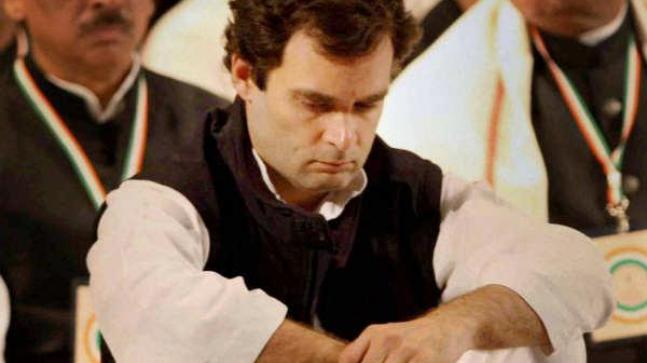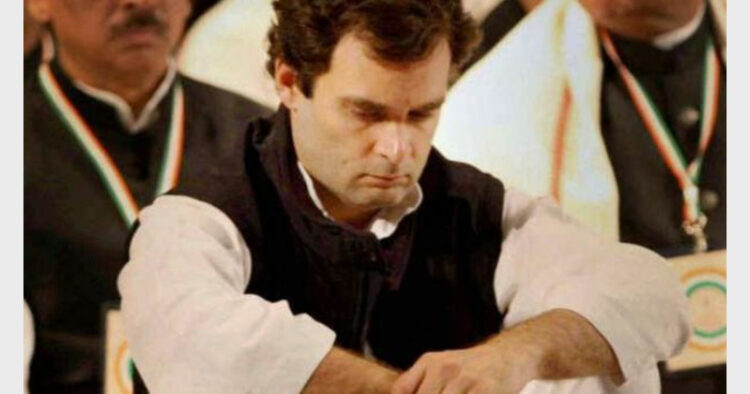As Bombay High Court and Supreme Court refused any relief, Bhiwandi Court framed charges against Congress president Rahul Gandhi in RSS related criminal defamation case
All attempts of Congress president Rahul Gandhi to delay the criminal defamation case against him in Bhiwandi court proved futile on June 12 when the Magistrate Shri AI Sheikh framed charges against him in the case filed four years back by an RSS worker Rajesh Kunte. The charges were framed under sections 499 (defamation) and 500 (punishment for defamation) of the Indian Penal Code. However, during these four years Rahul Gandhi tried his best to delay the case and he even approached the Bombay High Court and also the Supreme Court for relief, but in vain. The trial in the case will begin on August 10.
Reacting on the development in the case the complainant Rajesh Kunte said he has full faith in the court and he is sure justice will be delivered. “Framing of the charges is the primary stage in the case. Now the trial will actually begin. The matter is pending for four years. Even the Supreme Court had refused to grant any relief to the accused about two years back. Rahul Gandhi’s all tricks to delay the case have ultimately proved futile. I hope the truth will prevail and the guilty will be punished,” he said.
According to reports, the judge, while reading out the charges on June 12, said Rahul Gandhi defamed the complainant’s organisation, the RSS, through his remarks during a rally in 2014. The judge said the Congress chief harmed RSS”s reputation. It is to be noted that Rahul Gandhi during his election speech at a rally organised at Sonale in Bhiwandi, near Thane, on March 6, 2014 had accused “RSS people” of “killing Mahatma Gandhi”. On it, a local RSS worker, Rajesh Kunte, filed a criminal defamation case against him in Bhiwandi court.
After hearing the complainant Rajesh Kunte and pursuing the police report, the Magistrate had held that a prima facie case was made out against Rahul Gandhi and he ordered beginning of the process against him on July 11, 2014. Judicial Magistrate First Class (JFMC) SV Swamy had then ordered that summons be issued against Rahul under Section 500 of the Indian Penal Code (defamation). Rahul was then asked to appear before the court on October 7, 2014. But instead of appearing in Bhiwandi court for evidences, Rahul sought quashing of the complaint by filing a plea in the Bombay High Court stating that he may be exempted from his personal appearance before the Bhiwandi court as the complaint against him had a malafide intention. The High Court first granted him interim relief, but later Justice ML Tahaliyani on March 10, 2015 dismissed his plea. The High Court had also refused to grant stay on its order to allow the Congress leader time to appeal against it in the Supreme Court.
In his plea before Bombay High Court, Rahul had claimed that the complaint against him was politically motivated. But the respondent Rajesh Kunte argued that his petition was not malafide or politically motivated. He said since the Bhiwandi court was hearing the complaint, it was important for Shri Gandhi to lead the evidence before the court. Kunte argued that if Shri Gandhi can come to Bhiwandi to deliver a speech, he can also come there to appear before the court. Rahul’s petition was opposed by Maharashtra Government on technical grounds. The government counsel told the Court that since the lower court was already conducting trial in the matter, Rahul should remain present there and lead the evidence.
In 2016, the Supreme Court said Rahul must either apologise or face the trial for his remarks. “You can”t make wholesale denunciation of an organisation,” the top court had said. Talking to Organiser, Advocate Ganesh Dharghalkar, the counsel of petitioner Rajesh Kunte said that there cannot be different law for different people. “The law is same for all. The High Court has rightly supported our argument. If an ordinary person has to appear before the court in any case, the VIP too should appear,” Dharghalkar said.














Comments